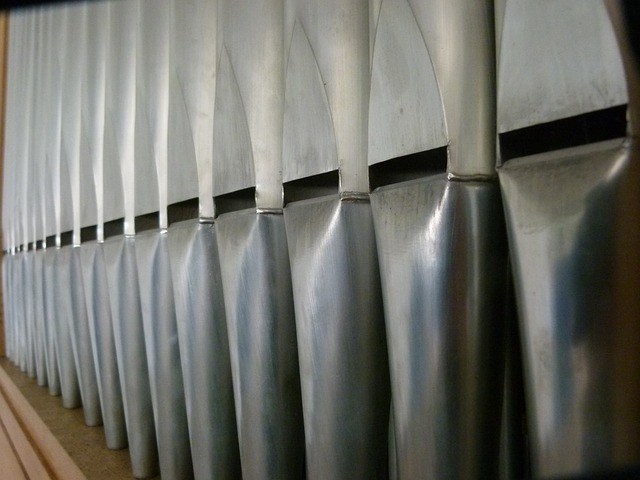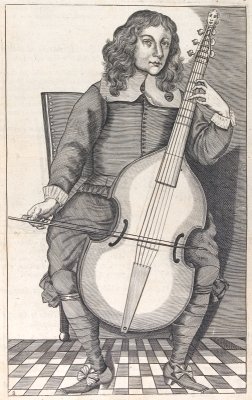Of Bows and Wines
A bow in a pipe

The first violinist from a baroque orchestra I had the pleasure to play with was someone that knew a lot about early music. She had this beautiful collection of early violin bows replicas and she would bring 4 ou 5 each concert for us to see and try and know who made the replica, where was the original, etc.
Her most recent bow was so genuine that changed my mind forever (and hers, because she started selling all her previous bows!). It was a replica of a bow that was found inside a pipe of a church organ that was dismantled in the Netherlands. So we can guess what happened: some day in the XVII century some poor violinist was playing and accidentally dropped his bow inside one of the pipes. Since it is quite expensive to pull out an object from an organ pipe, he just left it there.
It made me think. In early music we try to understand how music was made and played in early years. If you want to know how was the playing of a regular musician in that time, you need to know how the everyday bow was made and used. So why would we use bows copied from originals that were preserved because they were very good, or made by the finest archetiers, or played by the best musicians?

The upside-down History
Here's another example: for someone that collects wine bottles, which bottles do you think are the most rare and expensive? The good wine bottles, or the not-so-good wine? Answer: the bad wine. Because people would preserve the good wine because it would increase in value... But the not-so-good wine, they would drink it!
If history books say that the use of percussion instruments in the church was forbidden... Immediately we know that people used percussion instruments in the church. Otherwise it wouldn't be forbidden, right?
This "upside-down" deductions from what is left from the past has definitely changed my mind on History classes. Just the simple fact that something is written means that it could be preserved by someone who knew how to read and write and had the time or money to make it happen... That was SO rare!
The upside-down History
On the other hand, this makes me feel so tiny! Because think... How many things were simply lost in time? No recipe book can tell us how did common people cook. How was the music from the regular street musician. How did people dress. Or how were their houses made and decorated... We only have clues, and clues, and clues.
This episode changed my mind regarding History classes, were we are told that History is what comes on the books. That a good example of early art is the one on the museums, and that everything that happened is what is written.
Now I think there is much more beyond that!

Here are some great posts I read today and I recommend:
Making your own herbal deodorant by @lilfarms
For the love of discord by @skycae
Continuous self renewal sustained communities through unending educational growth by @juvyjabian
Will we ever be able to speak with animals? by @ralk98
What is early music? by @musicapoetica


Thanks for the mention!
Please let any classical musicians or classical music lovers that you know to subscribe to @classical-music, and to start using the #classical-music hashtag, so we can try and grow our community! Join us at our Dischord: https://discord.gg/ppVmmgt
@zpedro, back in my other guise.
Okay, I just wanted to say first that it was a good article and I enjoyed reading it. However, I would return back with a couple of nuances. Also, unless our director replies (he is more studied than I), I am less historically orientated and more performance... I'm sure he could provide better feedback.
For the bow example. If we only used discarded or lost bows to recreate the past then I would agree, perhaps we are on the wrong path. But we do have knowledge about the making techniques and designs that have been documented in writing and also in other sources. I would have to follow up by asking the makers here in NL, but they have studied their craft to an equal depth as what we have done as performers.
With the wine bottle analogy, I think it is a bit of a flawed analogy as it can be read in many ways. Too much is left to personal experience, I would prefer to drink the good wine instead of the bad. Money and potential future value is of less importance to me than the pleasure of actually experiencing the wine! But I'm not sure I understand the point completely!
I think the "forbidden" argument holds some weight, on the other hand writing that something is forbidden doesn't necessary indicate something was common either?
I agree with the fact that we only have hints and clues and that we can never (especially in such an ephemeral art as music) know the complete truth. However, I would argue that we need to inform ourselvesproperly (so beyond memorising a few sentences and stereotypes from a couple of famous treatises) before we make an artistic decision. Our musical "instincts" are only born from experience (of which scholarship is part of it). That said, I would argue that after we study, we should drop the books and not be extremist or ideological about our choices. However, I know in Early Music, that is not necessarily the prevailing view!
Hope that makes sense, it's late and I'm tired. I agree with you, that we can't know the complete truth, however it is not a futile effort to try and inform ourselves!
Of course, I'm not saying we should dump what it's written! After all, that's all we got. But creativity, science and logic make as much difference as reading what is left from the past, and that's what I meant about the "upside-down" History.
For example, I have a friend that wanted to prove that Portuguese guitar descended from the Arab citar, but of course nothing is written about such a instrument from the lower classes... He went after the police reports, finding someone that was playing citar at 4am beneath a beautiful lady's window or something like that... Clever studying!
Anyway I agree with you 100%! There's this difficult balance between reading and respecting the early music sources and images and whatever is left, and following musical "instincts" and let creativity flow. Some people do too much of one thing and become dull and boring... Some people do too much of the other and become a bit of circus players disregarding everything.
About the wine analogy, I should say I'm talking about collecting wine bottles, and not the wine itself :)
How cool, using a bow found in an organ pipe! And yeh, for sure not all of what happened in the past is preserved. Maybe it is also good; We can keep inventing things already invented before :)
Yes! It sure makes us free to imagine what happened in the past :) Thank you for your comment!
@zpdero, I am just writing up a curation. I was reading this article, and will try to respond soon.
This was a fun read! Yes, history is written by the 'educated' and the typical day-to-day was not valued and lost to history. We presume to know a lot about the past, but so much has been lost because it was not valued. I wonder how much of our history today would become lost to the ravages of time, simply because the knowledge is taken for granted. We tend to record the profound, but not the mundane. But it's the mundane that becomes valuable in the future because it was not preserved and has become rare.
I think of it as the silver/gold paradigm. Gold is more rare, valuable and collected. Silver is more common and utilized. If all the bank-vaults were opened and gold and silver flooded our economy, we may be shocked to find there is way more gold than silver. Simply because gold has been mined so diligently and hoarded in the bank vaults for so long, it would become common. Silver on the other hand is not as sought after and mined as much, has been minted into coins (some which are lost), used in photography, used in electronics and plumbing. It's more common, but also more useful. We may find that it's actually more rare.
@ironshield
Wow! Interesting thoughts on silver and gold! Never though of that. For the use we give to it, and as a resource, of course silver is more rare! Gosh... This even touches on the scarcity of crypto coins and stuff, because that's much better than valuing some random resource... Man, thank you so much for your comment. I need to think about it :)
Congratulations you have been upvoted because you, or a friend left a post in the NewbieResteem Post promotion Box. Discord Chat channel post Promotion Box.
I liked the article, but being from a non-artistic musical person. I read the other comments left, and to me it seems the writing was meant for the novice, and not for the professional crowd, so I liked it.
Clicking on the images will take you to "Newbie Resteem Initiative info" - Our Discord Channel - abh12345's - IFC page
We invite you to use our tag (#newbieresteemday) to connect with more of our members. To learn more visit: Come Join Us!!! (Newbie Resteem Initiative)
I @bashadow invite you to also click on the IFC Castle and learn about @apolymask and his game, be sure to tell them I sent you. As abh12345 has made lots of votes possible, apolymask thru his IFC game has made lots of fun possible.
Lots of votes made possible due to the kindness of abh12345 and his Steemit Curation Leagues
Had never heard of the ban on percussion instruments in the churches. I like how you pointed out that at one time they must have had them in order to be banned. It's the read between the lines history. I enjoyed reading your writing @zpedro :)
Thank you @jackdub! I'm pleased you enjoyed reading! Indeed, it doesn't mean that it was common to use percussion instruments (otherwise people would turn themselves against the church) but it means that they were used and were probably a controverse use...
It reminds me of churches in the south where people would jump up and start clapping in rhythm with the singing. They seemed so full of joy and excitement, a stark contrast to the somber northern churches.
This post just got a free resteem to 5200 followers.
I am not a bot. Upvote this comment if you like this service
This post has received a 0.07 % upvote from @drotto thanks to: @banjo.
Congratulations! This post has been upvoted from the communal account, @minnowsupport, by zpedro from the Minnow Support Project. It's a witness project run by aggroed, ausbitbank, teamsteem, theprophet0, someguy123, neoxian, followbtcnews, and netuoso. The goal is to help Steemit grow by supporting Minnows. Please find us at the Peace, Abundance, and Liberty Network (PALnet) Discord Channel. It's a completely public and open space to all members of the Steemit community who voluntarily choose to be there.
If you would like to delegate to the Minnow Support Project you can do so by clicking on the following links: 50SP, 100SP, 250SP, 500SP, 1000SP, 5000SP.
Be sure to leave at least 50SP undelegated on your account.